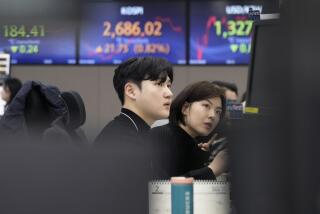Tokyo Stock Market Posts Highest Gain in Three Years : Japan: Belief that differences on economic policy may soon be overcome push the Nikkei index up 7.8% to 20,229.
- Share via
TOKYO — Amid one of the most powerful Japanese stock price surges ever, top leaders in Prime Minister Morihiro Hosokawa’s seven-party ruling coalition Monday struggled to resolve sharp policy differences that have blocked agreement on economic stimulus measures.
While the governing parties remain deeply split in their preferences on tax policy, expectations that those differences will soon be overcome contributed to the sharpest one-day increase in stock prices in more than three years.
The Nikkei-225 index shot up 1,471 points, or 7.8%, to close at 20,229, the highest level since Oct. 25. In terms of points, it was the third-largest one-day gain the market has ever seen. The jump was based on relief that the government had survived a crisis over political reform, and on belief that a massive stimulus package will soon be announced.
In trading today, the Nikkei closed its morning session up 224 points at 20,453.
Hosokawa’s Cabinet is due to announce later this week a package of income tax cuts and public spending worth at least $130 billion. There has been a fierce battle within the government, however, about whether the income tax cuts--which would make up nearly half the package--should be balanced by a consumption tax increase.
The Socialist Party, the largest member of the coalition, opposes any increase in the consumption tax, which is similar to a sales tax and currently set at 3%. The Ministry of Finance has insisted that it would be highly irresponsible to do anything less than raise the consumption tax enough to cover the revenue losses from an income tax cut. Most parties in the coalition favor cutting income taxes first, then raising the consumption tax within one to three years.
The argument is in part a debate over tax reform as opposed to economic stimulus. The Ministry of Finance is looking many years ahead, to the aging of Japanese society. Its belief is that part of the tax burden must be shifted from the declining number of people in their working years to free-spending consumers of any age.
If tax cuts and increases are balanced from the beginning, that should be good for government finances, but the stimulative effect of the package could be seriously weakened. The Clinton Administration, wishing to see Japanese economic growth that would pull in U.S. exports, has spoken out forcefully in favor of highly stimulative tax policy and against the approach favored by the Ministry of Finance.
More to Read
Sign up for Essential California
The most important California stories and recommendations in your inbox every morning.
You may occasionally receive promotional content from the Los Angeles Times.













